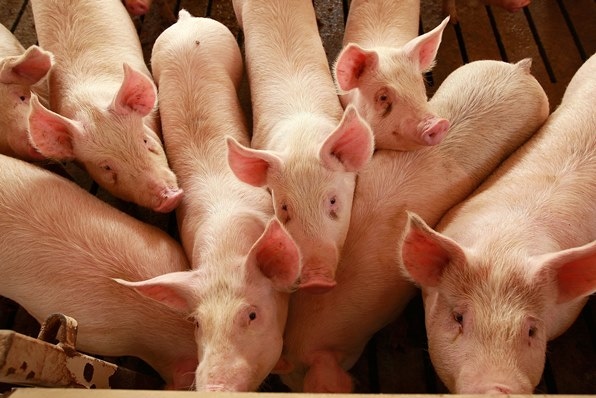Phibro has complete confidence in the safety of the product.
April 8, 2016

The U.S. Food and Drug Administration’s Center for Veterinary Medicine took the first step toward rescinding its approval of the use of carbadox to treat swine because the drug may leave trace amounts of a carcinogenic residue.
CVM’s action comes after the center recently reexamined the safety profile of the drug and conducted a preliminary risk characterization that indicated there could be potential risk to human health from ingesting pork, especially pork liver, derived from carbadox-treated pigs.
“The manufacturer of carbadox has failed to provide sufficient scientific data to demonstrate the safety of this drug given evidence that carbadox may result in carcinogenic residues,” says Michael R. Taylor, FDA deputy commissioner for foods and veterinary medicine. “As a result, FDA’s Center for Veterinary Medicine is taking legal action to remove this product from the marketplace.”
The FDA is not recommending that people make changes in their food choices while the agency is working to remove carbadox from the market. Potential cancer risks are based on an assumed lifetime of consuming pork liver or other pork products containing carbadox residues, and short-term changes in diet are unlikely to affect a person's lifetime risk. However, removal of the product from the market will reduce the lifetime risk to consumers, which is why CVM is taking this action. Pork liver is used to make liverwurst, hot dogs, lunchmeat and some types of sausage. In general, eating a varied diet may reduce the potential negative effects of eating too much of any one food.
FDA-approved alternative antibiotics are available to pork producers to treat swine.
CVM is committed to working with pork producers to minimize impacts on the swine industry.
Manufacturer defends the drug
In response, the manufacturer of the swine drug Phibro Animal Health states “Mecadox (carbadox) has been approved and sold in the United States for more than 40 years and is a widely-used treatment for controlling bacterial diseases including Salmonella and swine dysentery. Mecadox is not used in human medicine and the class of drug is not considered a medically important antimicrobial. The approved Mecadox label requires a 42-day withdrawal period pre-harvesting, and to date we have not seen any hazardous residues of carbadox being detected from pig meat treated in accordance with the approved label.”
The FDA approved the original application for Mecadox in the early 1970s and a supplemental application in 1998, each time as a result of a rigorous safety review. Several years ago, in response to the availability of more advanced analytical detection methods, the FDA began to raise questions about the persistence of residues in tissue longer than previously determined. Since that time, Phibro Animal Health has cooperated fully with the FDA’s inquiries, including undertaking comprehensive, rigorous new studies using the latest and most sensitive technology available. Phibro has been providing the data to the FDA as it is generated, and in accordance with the schedule submitted to the agency, and to date that evidence has been positive regarding the safety of Mecadox and has reiterated the safety of Mecadox when used in accordance with the label. As Phibro has told the FDA, our studies are due to be completed in the next 90 days and we expect that the remaining evidence will support the continued safe use of Mecadox.
This action by the FDA does not prohibit the sale or use of Mecadox in the United States. After 40 years, carbadox remains a highly effective treatment for controlling bacterial diseases and swine dysentery.
Phibro has complete confidence in the safety of Mecadox. We are disappointed that the FDA would take this action when definitive studies are so close to being completed. Under the FDA’s process, we intend to request a hearing and refute the allegations. Phibro will continue to market the product and to vigorously defend Mecadox based on more than 40 years of science and safe use.
FDA's next steps
Carbadox was first approved in the early 1970s for use in swine to control swine dysentery and bacterial swine enteritis. It has also been used for weight gain and feed efficiency.
In July 2014, the Codex Alimentarius Commission determined there is no safe level of residues of carbadox or its metabolites in food that represents an acceptable risk to consumers. This was based on the Food and Agriculture Organization of the United Nations/World Health Organization Codex Committee on Residues of Veterinary Drugs in Foods’ conclusions on the available scientific information.
To remove its approval, CVM must first file a Notice of Opportunity for Hearing, which it issued today. The notice provides the manufacturer of carbadox with an opportunity to request a hearing on whether the approval should be withdrawn.
The company has 30 days to request a hearing. If the company does not request a hearing, the agency can proceed with removing the animal drug from the market.
You May Also Like



